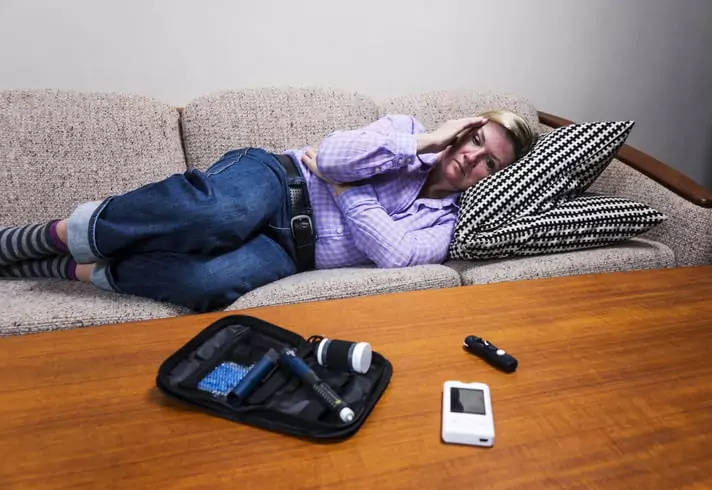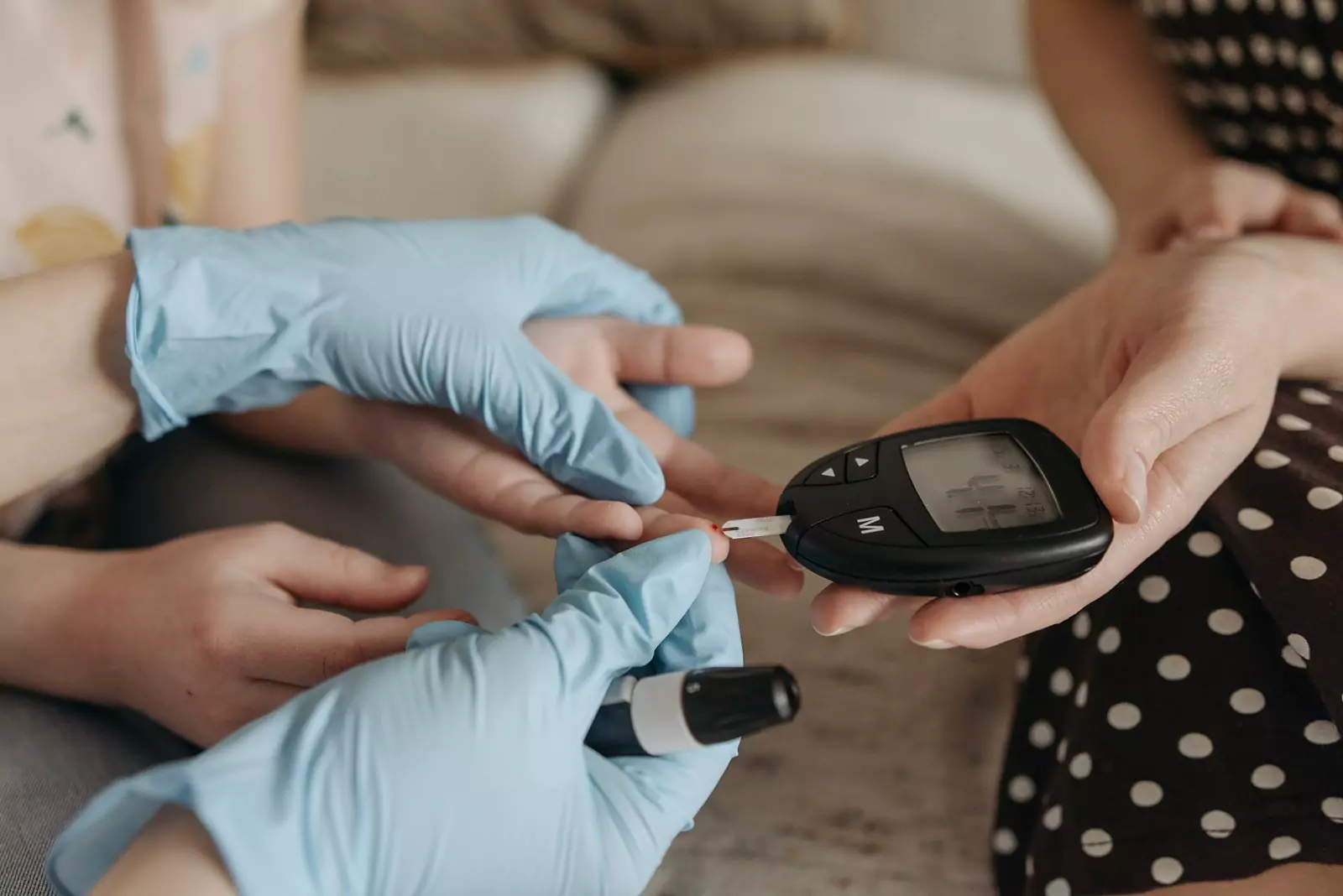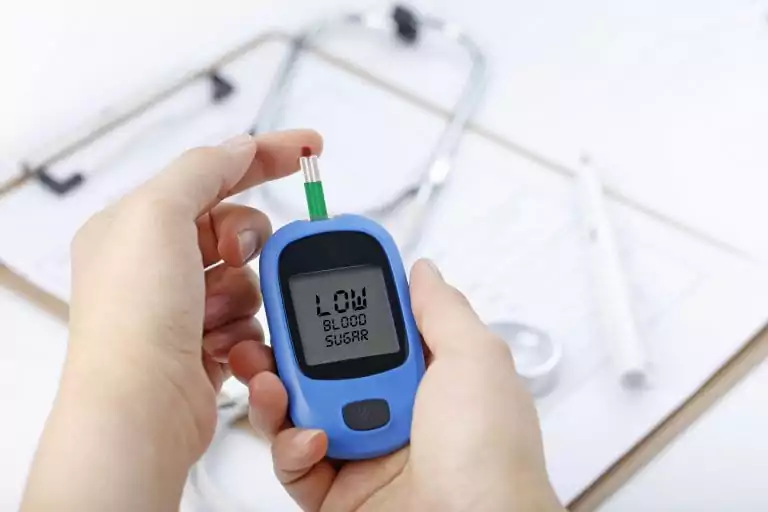
UP TO 40% OFF SITEWIDE






Diabetic Symptoms: It May Not Be Diabetes After All!


Do you feel thirsty all the time? Do you go to the bathroom often even if you don't drink that many fluids? Do you have blurred vision? If so, you may be one of the 29 million people in America who have diabetes, but not so fast.
Diabetic symptoms can be very vague and general, which is why many people don't know they have it until it's too late, or they panic after reading a few articles online. This blog post will discuss some of the most common diabetic symptoms and how to know if you have diabetes.
A patient of mine, James, was feeling down about himself. He had been experiencing some symptoms and thought he might have diabetes. Diabetes was a disease that his mother had, so James knew all too well the risks and implications of having it. The possibility of having to deal with all of that was just too much for James, and he fell into a deep depression.
Fortunately for James, he stumbled across this article that explained his symptoms better. It turned out that James didn't have diabetes after all, but another disease called Addison's Disease was confirmed with lab testing.
Let's talk about what diabetic symptoms that are important and specific to diabetes and find out the causes of these symptoms other than diabetes.
Excessive Urination
Polyuria, excessive urination, and polydipsia, extreme thirst, are two of the most common and specific diabetic symptoms. There are many potential causes of excessive urination, and diabetes is only one of them. Other potential causes include kidney disease, urinary tract infection, and certain medications.
In diabetes, excessive urination is caused by high blood sugar levels, which damages the kidneys and makes it difficult for them to filter out waste. Urinary tract infections can also cause frequent urination as the body tries to flush out the infection. Medications such as diuretics can also lead to increased urination as they work to remove excess fluid from the body.
If you are experiencing excessive urination, it is important to speak with your doctor to treat the underlying cause properly. If you find yourself going to the restroom more than normal or always feeling thirsty no matter how much water you drink, it's important to consult your doctor.
Weight Loss
One diabetic symptom that is often overlooked is weight loss. People with diabetes may lose weight even if they are eating more than usual. This happens because the body is unable to properly metabolize the food it is taking in. If you are losing weight without trying, it's important to speak with your doctor.
However, there are many other potential causes as well. Other potential causes of unexplained weight loss include cancer, HIV/AIDS, gastrointestinal disorders like celiac disease or Crohn's disease, endocrine disorders like thyroid disease, and psychological conditions like anxiety or depression. If you are experiencing unexplained weight loss, it is important to see a doctor to properly diagnose and treat the underlying cause.
Fatigue
Diabetes can also cause fatigue. This happens because the body is not able to properly use the sugar in the blood for energy. As a result, people with diabetes often feel tired and have trouble concentrating. It is important to know the causes of fatigue other than diabetes.
Fatigue can be caused by many things, such as diabetes, anemia, chronic fatigue syndrome, depression, fibromyalgia, sleep apnea, and medications including some diabetic medications. Treatment for fatigue will vary depending on the underlying cause. If you have diabetes, your doctor will likely treat your diabetic symptom with medication and make lifestyle changes to help control your diabetes.
If you have anemia, your doctor will likely prescribe iron supplements. If you have chronic fatigue syndrome, your doctor may recommend exercise and stress-reduction techniques. If you have depression, your doctor may prescribe antidepressants. Your doctor may recommend pain relievers and physical therapy if you have fibromyalgia.
If you have sleep apnea, your doctor may recommend a CPAP machine to help you breathe at night. If you are taking medications that cause fatigue as a side effect, your doctor may recommend changing your dose or switching to a different medication.
Blurry Vision
Diabetes is a cause of blurry vision. Other causes include refractive error, where the eye does not focus light properly; astigmatism, an imperfection in the curvature of the eye's lens or cornea; presbyopia, when the eye's lens stiffens with age and makes it difficult to focus on close objects; and cataracts, a clouding of the eye's lens.
Diabetes can also cause diabetic retinopathy, a condition in which damaged blood vessels in the retina leak fluid or bleed, causing blurred vision. If you have diabetes, it is important to see an eye doctor regularly to check for these problems.
This is caused by high levels of sugar in the blood, which can pull fluid out of the lenses of your eyes. Left untreated can lead to other serious eye problems, such as diabetic retinopathy. Blurry vision is an important diabetic symptom you do not want to ignore.
Excessive Hunger
While diabetes is one of the most common causes of excessive hunger, there are other potential causes as well. For example, certain medications can cause hunger as a side effect. Medications used to treat conditions like anxiety and depression can sometimes increase appetite. Certain hormonal disorders can also lead to feelings of excessive hunger.
In women, for example, conditions like polycystic ovary syndrome (PCOS) can cause drastic fluctuations in hormones that can result in excessive hunger. Other medical conditions that can cause excessive hunger include celiac disease, hyperthyroidism, and Addison's disease. Anyone who experiences sudden or excessive hunger should speak with a doctor to rule out any underlying medical conditions.
Neuropathy (Numbness and Tingling on Hands and Feet)
Neuropathy is a condition that can cause numbness, tingling, and pain in the hands or feet and can be a diabetic symptom. It is most commonly caused by diabetes, but there are other potential causes as well. These include autoimmune diseases such as autoimmune thyroid disease(Hashimoto's), nerve damage from injury or surgery, genetic disorders, and certain medications.
In some cases, the exact cause of neuropathy is unknown. However, treatment for the condition typically focuses on managing symptoms and preventing further damage. With proper care, many people with neuropathy are able to lead full and active lives. For more information about diabetic neuropathy please read this article. Also check SugarMD Neuropathy support to heal and prevent diabetic neuropathy.
Dry Skin
While diabetes is often thought of as the primary cause of dry skin, there are actually a number of other potential causes. Environmental factors such as wind and cold can strip away moisture, while hot water can strip away natural oils.
Dehydration can also make the skin feel dry and tight. In addition, certain medications can have drying side effects, and skin conditions such as eczema can also lead to dryness. Luckily, there are a number of ways to combat dry skin, including using gentle cleansers, applying moisturizers regularly, and avoiding hot showers. By taking these steps, you can help keep your skin hydrated and healthy.
Sores that Heal Slowly
One potential cause of sores that heal slowly is diabetes. This is because diabetes can cause poor circulation, which in turn can lead to slow healing. Diabetes can also cause nerve damage, making it difficult for the body to send signals promoting healing.
In addition, diabetes can weaken the immune system, making it more difficult for the body to fight off infection. If you have diabetes, it is important to see a doctor if you develop any sores that heal slowly, as this could be a sign of a more serious problem. Other potential causes of sores that heal slowly include infection, poor nutrition, and certain medications.
If you have a sore that does not heal within a few weeks, it is important to see a doctor to rule out any underlying problems. Treating the underlying cause will help to promote healing.
Frequent Infections
One of the most common causes of frequent infections is diabetes. When blood sugar levels are high, it can weaken the body's ability to fight off infection. In addition, diabetes can also cause dry skin, which is an ideal breeding ground for bacteria and other microbes.
However, diabetes is not the only cause of frequent infections. Other possible causes include immunodeficiency disorders, chronic skin conditions, and exposure to toxic substances. Regardless of the underlying cause, frequent infections can be a serious health concern. If you experience repeated infections, it is important to consult with a doctor to determine the cause and develop a treatment plan.
Areas of Darkened Skin
While diabetes is one possible cause of areas of darkened velvety skin, mostly under armpits or nack or creases, there are other potential causes of darkened skin as well. For example, hyperpigmentation(excess pigment/color) is a common side effect of certain medications, including some antibiotics and oral contraceptives.
This occurs when the body produces too much melanin, the pigment that gives skin its color. Sun exposure can also cause hyperpigmentation, as can certain skin conditions like acne or eczema. In addition, areas of darkened skin can be caused by hormonal changes, such as those that occur during pregnancy or menopause.
Finally, some people may develop dark patches of skin due to underlying health conditions, such as Addison's disease or Cushing's syndrome. If you are concerned about any changes in your skin, it is important to speak to a dermatologist for a proper diagnosis. If you have diabetic symptoms, don't panic.
Diabetic symptoms can be caused by many different things and don't necessarily mean that you have diabetes. However, if you have several diabetes symptoms, it's important to see a doctor so that they can test for diabetes. Common diabetic symptoms include frequent urination, extreme thirst, fatigue, blurred vision, and slow healing wounds.
If you have any of these diabetes symptoms or are worried about diabetes symptoms, make an appointment with your doctor. They can give you a blood test to check for diabetes. Early diagnosis and treatment of diabetes are essential to preventing serious health complications. This article is for informational purposes only and is not a substitute for medical advice, diagnosis, or treatment.
If you have any concerns or questions about your health, you should always consult with a doctor or other healthcare professional.
About the author
Dr. Ahmet Ergin is the author of The Ultimate Diabetes Book and the Founder of the SugarMD YouTube channel. He practices in Port Saint Lucie, FL as an endocrinologist physician.
Written By Dr. Ahmet Ergin
465 total articles
Meet Dr. Ahmet Ergin, a highly skilled and dedicated endocrinologist with a passion for diabetes care. Dr. Ergin earned his medical degree with honors from Marmara University in Istanbul. He completed internal medicine residency and endocrinology fellowship at Cleveland Clinic. Dr. Ergin is board-certified in Internal Medicine, Endocrinology, Diabetes, and Metabolism due to his vast medical expertise. He's a certified diabetes educator, author of “The Ultimate Diabetes Book,” and founder of “the SugarMD YouTube channel.” Dr. Ergin offers exceptional diabetes care to his patients in Port Saint Lucie, FL, helping them manage effectively. For a closer look into his insights and experiences, connect with Dr. Ahmet Ergin on LinkedIn, Instagram, and YouTube.”
Disclaimer: These statements have not been evaluated by the Food and Drug Administration. Information on this website isn't intended to treat, cure or prevent any disease. Discuss with your doctor and do not self-treat.
Products











